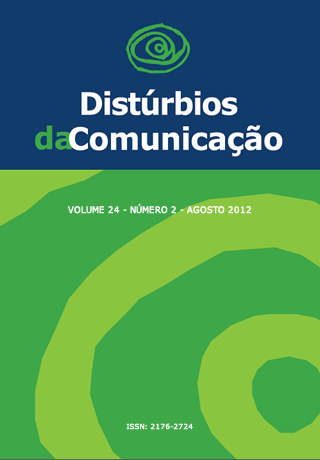Therapeutic process effect on speech fl uency problems in parents discourse
Keywords:
stuttering, parents, therapyAbstract
Purpouse: To study, through the speech of parents, the effects and effectiveness of a therapeutic process for speech fl uency problems based on a historical-dialectical approach. Method: qualitative research using semi-structured interviews with three families that have therapeutic work with the researcher. The interview began with the phrase: Tell me about your child’s therapeutic process. The interviewer intervened to ensure that respondents talked about the vision they had about their children, his speech and the changes they observed. The transcribed interviews were categorized according to Bardin’s Content Analysis in four categories: Therapeutic Approach; Experiences and Affections; Causes and Vision that Parents have about the Child, the Language and his Stuttering, the last one structured in three subcategories: Feelings and Thoughts on Stuttering and Language; Social Situations and Characteristics of Communication. Results / Discussion: The therapeutic effects observed from the analysis of the categories were: in Therapeutic Approach parents reported that, unlike other approaches, with the dialectical historical approach they felt part of the therapeutic process. In Experiences and Affections reports that speech moments before felt as harassed and helpless, came to be shared and seized as part of the process of speech production and that they understood that their feelings have an effect on the speech of the child. In Vision that Parents have about the Child, the Language and his Stuttering reports about how the speech of their children was; about the changes observed; about the stigma they and their children carried and about their understanding that the social contexts intensifi ed stuttering. Conclusion: These effects indicate that the therapeutic process supported on the historical dialectical approach was effective for the participants in this study. It also indicates that effectiveness is not only measured by the decrease in stuttering and disfl uency of children, but mainly by change of attitude of parents toward this form of speech, which enabled such a decrease. This result points to the need and importance of further studies about this type of approach.Downloads
Download data is not yet available.
Metrics
Metrics Loading ...
Downloads
Published
2012-10-08
Issue
Section
Artigos
License
Copyright (c) 2012 Thais Inocêncio Pires, Silvia Friedman

This work is licensed under a Creative Commons Attribution 4.0 International License.









